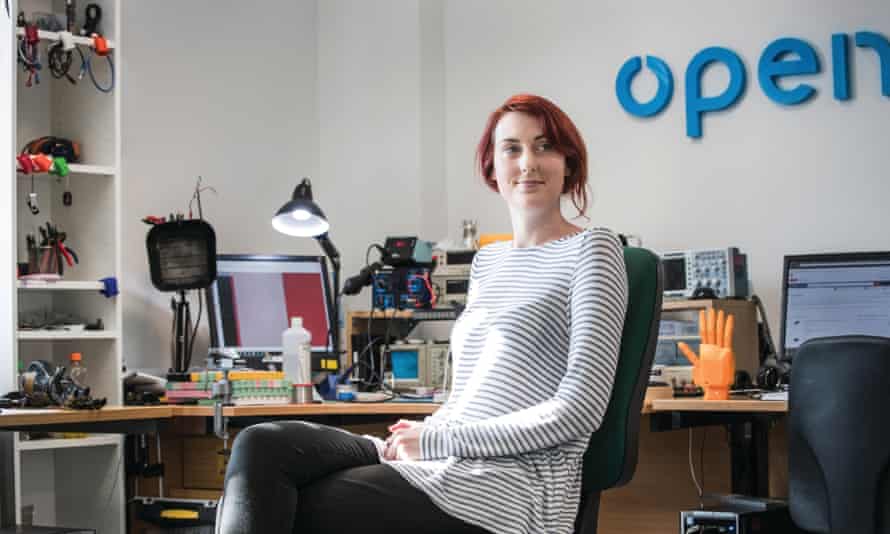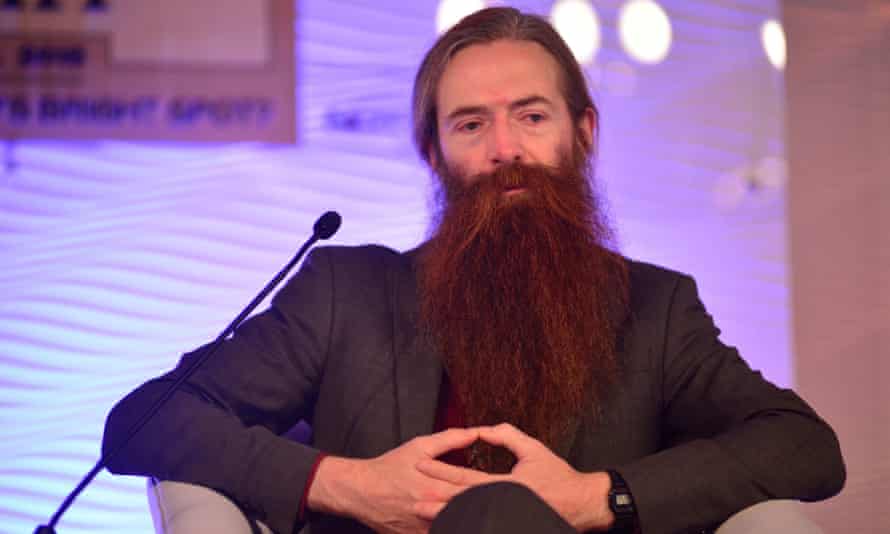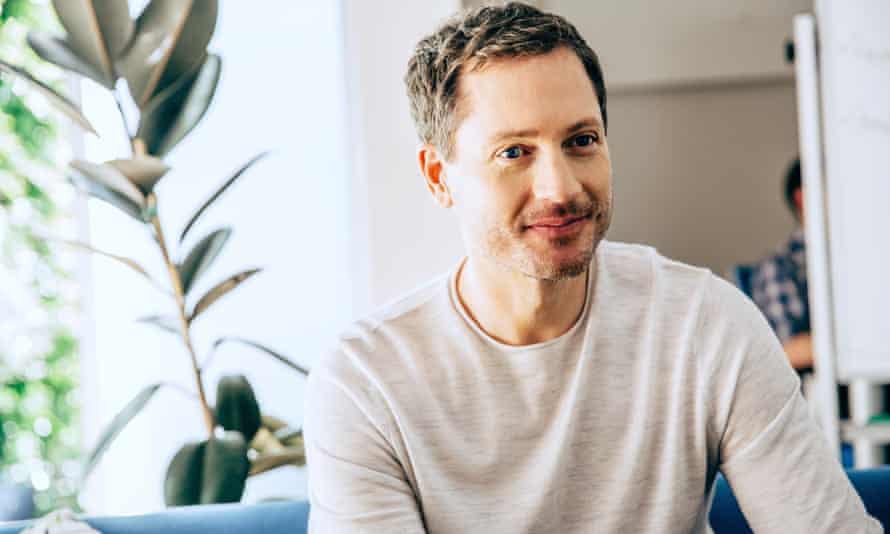What Will Humans Look Like in 1 Million Years
P redicting the future is a fool's game at the best of times. Right now it's madness – so much is up in the air technologically, politically, economically, ecologically and spiritually, it seems as likely we'll be shivering in caves as enjoying our new bionic exoskeletons by 2118. For all the talk of humans living longer, life expectancy has flatlined in recent years. The near future doesn't look younger and fitter so much as older and fatter, as the median age in the developed world powers past 40 towards the middle of the century.
But of all the developments emerging now, it's technology focused on the human body that would appear to introduce the most chaos into the system. California biotech startups talk of making death "optional". Facebook is working on telepathic interfaces. Bionic limbs will soon outperform human limbs. Crispr-Cas9 gene-editing technology theoretically allows us to fiddle around with genomes. We could look, think and feel in radically different ways.
Are we ready to treat our bodies as pieces of hardware? We might be getting there. Take something as innocuous as tattoos, which have boomed in popularity roughly in step with the information age. Seen in one light, they're a faintly retro fashion trend. In another, they show an increased willingness to alter our physical selves. You might think of them as the surgeon's marks before the real enhancements arrive. I asked six scientists and thinkers to share their vision for the body in the next century.
'Able-bodied people will use prosthetic limbs': Samantha Payne , co-founder and chief operating officer of Open Bionics, a Bristol-based robotics firm

When we started in 2014, we decided to focus not only on bringing down the cost of prosthetics, but also on tackling the social stigma around disability. We found the best way to do that was to harness the narrative of superheroes and to make the devices super-stylish and enviable. We wanted children to walk into school and show off their new bionic hand and make their friends envious. It's the exact opposite of the experience amputees had before, where they'd have a fake hand with zero functionality, or a prosthetic hook.
Now we're seeing this interesting social phenomenon where bionic devices have become cool. They're more embedded in popular culture, more celebrated. And we're seeing how this technology might be used for able-bodied people. The German corporation Ottobock has produced prosthetic limbs for medical use and is now making mechanical exoskeletons for VW workers to enhance their performance in the factory. Roam Robotics has created an exoskeleton for skiers. We're going to see more of this. All we need is smaller motors, better batteries; once the components advance, the products will come to market.
I'm of the opinion that the hardware is going to get to the point where it can outperform the human body. That's not a small challenge – the human body is unbelievably complex. The strength, dexterity and sensory feedback of the hand is really hard to replicate. But we will get there. And then what will stop people wanting to swap their limbs? We've already had plenty of people on social media saying they're tempted to replace healthy limbs with bionic ones.
I feel there has been a huge cultural shift. We've found a very distinct gap between younger amputees and those aged 40 and older. The older ones wanted a bionic hand as close to real skin as possible. The younger generation all want highly personalised hands. We've moved from a society that valued conformity to one that celebrates individuality. People are more willing to experiment with their body. It's wide open.
'By 2030, I expect humans to be regularly going into body shops for upgrades': Zoltan Istvan, transhumanist author and campaigner
I got a chip implant injected into my hand while running for the 2016 US presidency as the nominee of the Transhumanist party. At the time, I only knew a handful of people who had them. Now tens of thousands do – and some companies encourage their employees to get chipped, so bosses can better track workflow. Implants are a small part of our transhuman future. Already biohackers I know plan to amputate healthy limbs and replace them with brain-controlled robotic ones. Robotic limbs are still 15 years from being more functional than human limbs – but that won't stop people who desire to be cyborgs. Robotic limbs can be upgraded as new technology becomes available.
The real gamechanger for future human health is bionic organs. Already dozens of medical companies are surgically fitting humans with robotic devices that mimic and replace specific organs, such as the pancreas, eyes and heart. Within 20 years, all these bionic organs will synchronise via personal instruction from one's smartphone, allowing humans to achieve feats they never imagined: climb Mount Everest at 80, or have wild sex all night. Bionic organs can and will outperform their biological counterparts; by 2030, I expect humans to be regularly going into body shops for upgrades.

The future of work is more complicated. Robots threaten to steal all our jobs. Companies in California such as Kernel and Neuralink are already tackling the problem, trying to make humans more efficient workers. They aim to create neural prosthetics that allow the human brain to communicate in real time with machine intelligence, including AI and the internet. And if our thoughts are connected directly to machines – supercomputers can already do 200,000 trillion calculations a second – where does that lead humanity? Transhumanists believe it leads to the Singularity, a moment in time – likely around 2045 – when the exponential evolution of machine intelligence grows beyond the comprehension capacity of the biological brain. Like an ant trying to understand people, homo sapiens won't understand AI that gets too smart. The only way for humans to stay at the top of the food chain will be to merge directly with AI – by uploading our thoughts and entire personality into it.
This future, sometimes called the hivemind – because everyone is jacked into AI and one another simultaneously – is a controversial outcome. But economics might force more of the transhuman future than people want. To be better than robots, we'll have to beat them, and that means joining them. Biology is simply too limited for us to remain competitive for much longer.
'You could have people living for thousands of years': Aubrey de Grey, biomedical gerontologist and chief science officer of the S ens Research Foundation, a charity focused on age-related disease

I'd say there is a 50/50 chance we will have brought ageing under decisive control within 20 years. In 100 years, there's an 80% or 90% chance we will have achieved that goal. There will still be aspects of ageing we can't control – various types of cellular and molecular damage – but we will be able to stay well within a comfort zone where that damage doesn't bring significant risks.
Once we don't have ageing, our longevity will be defined by other factors. We can put a crude number on that, if we extrapolate from today's mortality rates in early adulthood. The proportion of people who die at 26 is now less than one in a thousand. If we eliminate ageing, that rate will stay the same with each passing year: extrapolate from that and you could have people living for thousands of years. We'll also be bearing down on car accidents, pandemics, asteroids – so it makes no sense to put a number on how long people will live on average.
We have seen a levelling off of life expectancy recently – but that's largely because the advances that brought about the great increases in the 19th and 20th centuries are now hitting diminishing returns. There's also an obesity epidemic. But that ceases to be a problem when people don't need to look after themselves because the medicine is good enough, which will be the case fairly soon.
The single tipping point will consist of a combination of a number of therapies that repair various types of damage that accumulate in the body. We have worked to classify these types of damage into seven big categories, which allows us to work out how we might treat them. One of them is loss of cells, where they are dying and not being automatically replaced by the division of other cells. If that's happening, we need stem cell therapy. Different organs need slightly different types – but only slightly different, which is why the classification is useful.
I don't believe solving ageing will increase an economic divide. The benefits will be extraordinarily valuable; it will pay for itself in no time. Any country that makes the political decision not to pay for this through taxation will soon become bankrupt, as other countries keep their chronologically elderly populations contributing to society.
I don't see any existential risks. I'm interested in other risks, such as asteroid impacts; once we begin to understand that ageing is being eliminated, we will care much more about those risks and feel more invested in them. I'm not too worried about overpopulation, either. Overpopulation is really about pollution – the damage that people do. But we are acquiring solar technology, desalination, many things that will reduce the harm we do to the planet and therefore increase its capacity. There's no reason it couldn't house 70 billion people.
'My partner and I identify as cyborgs': Moon Ribas , co-founder of the Transpecies Society in Barcelona
Human beings will evolve. We haven't always been human. We were sea creatures, then we were living in the trees, then we became human. Soon we will become something else. Technology is part of our lives and it will become part of our evolutionary journey, too.
In 2013, I designed an extra sense for myself. I have sensors on my feet so I can perceive the seismic activity of the planet: when there's an earthquake somewhere, I feel it. I call it the seismic sense. I don't consider it a body-hack but a mind-hack – my aim was to use technology to change my perception of reality.
We're moving into an age where we can use technology to perceive things we couldn't otherwise. It's exciting that everyone will be able to design their own senses. My business partner, Neil Harbisson, has an antenna implanted in his skull that allows him to hear colour waves. It picks up colour frequency, which creates vibrations in his skull, which he perceives as sound. His colour perception is now greater than ordinary human perception as it includes ultraviolet and infrared. A friend has extra senses in his ears that can detect atmospheric pressure and allow him to predict the weather. We're designing a retro-ceptive sense so you can see what's happening behind you; cars have it already. Instead of uploading new senses for our phone we will soon be uploading new senses for the self.
My partner and I identify as cyborgs as we are no longer 100% human. We have new body parts that give us access to perceptions that are beyond usual human perception. It's not about augmenting reality, or living in virtual reality; it's more about revealing a reality that already exists.
I'm sure there will be companies offering this commercially in future – but for me, that's not as interesting as the creative possibilities. I now have two beats in my body, a heartbeat and an earth beat. I don't feel closer to machines; I feel closer to nature and other animals. I think it's perfectly conceivable that we will be able to alter our bodies in such a way that we feel closer to the planet. We can be inspired by other creatures and how they perceive reality. That's my optimistic point of view.
'The body will have human elements, but will be integrated with technology': Braden Allenby , environmental engineer at Arizona State University and co-author of The Techno-Human Condition
We are entering the Anthropocene – an era in which it is humans who are the most critical to the way life on the planet evolves. But humans are not only altering the Earth – we're also designing ourselves. Artificial intelligence and gene-editing technology mean the human being has become a design space.
I believe the split between the human world and the natural world that we've all grown up with will begin to look obsolete. The human will become very different, as we fuse our individual selves into techno-human networks. We're used to thinking of ourselves as Cartesian individuals: separate from nature, separate from other human forms. But if you look at what's happened to our cognitive processes in the last couple of decades, you'll see that's already changing. We've already outsourced much of our cognitive ability to Google. People can't read maps any more because Google Maps tells them where to go. Darpa (the US military's Defense Advanced Research Projects Agency) recently chipped an individual so he could telepathically control multiple drones. That's just the beginning.

At the same time, our individual identities have become a new battle space – and the implications for cognition are huge. Everything we learn about the brain shows how flawed our decision-making processes are, particularly when we're under stress. Our cognition is not as effective as we think. The modern information environment is far more complex and faster than anything we've experienced. People are responding by falling back into simple narratives and identity politics as a defence against this complexity. Malign actors are learning how to manipulate these identities.
If we can survive this moment, I think we will move towards a world where man is no longer the measure of all things. It will turn out we're simply components of large operating systems. Rather than the Frankenstein image of technology destroying humans, we will integrate the two. The body will still have human elements; but it won't look like anything you and I call human. It sounds hard to imagine – but it is already happening. Look at any city street. At least half the people are looking at their phones. We're already integrated into networks beyond our physical environment.
'I'd like to bring the brain online': Bryan Johnson, founder of Kernel, the California start up that designs brain-machine interfaces

What we will be like in 100 years is one of the most relevant questions we could be asking as a species. It's generally been the case that humans could reasonably predict the circumstances of their life and their children's lives, too. Now, the rate of change is such that we can't see further than a decade or two ahead. The aim is not to get people to predict the future. It's to get them to appreciate that they can't predict the future and to create alternative models to think about the future.
We're just a few tool discoveries away from being able to radically improve ourselves. I'm building brain-machine interfaces that will bring the brain online, in a similar way to how other bodily functions are now online. Your footsteps are "online", if you want them to be. The nutritional value of the food you eat can be "online", too. But your brain is offline. If I want to know what's going on inside your brain, I have to ask you: "What's going on in your head?" You will then query the small portion of your brain you're aware of. What I'd like to do is bring as much of the brain as possible online, and make it as much of an intermediary of our existence as smartphones are.
We can measure what computers are doing with megabytes and gigabytes. I'm trying to imagine a scenario where we can quantify our brain activity in "attebytes". At the end of the day, you can download a pie chart of your brain's neuro-processes. You might find you've allocated 737,000 attebytes of attention to a conversation about the future. You might discover you thought about an argument you had with your partner 45 times that day. Think of it as a step counter for the brain.
If that data goes online, what would happen? There is a dystopian scenario where the brain becomes open for business. You can imagine the goods and services that could evolve around knowing what's happening in someone else's brain. Facebook is currently working on brain-machine interfaces, but adding something like this into their ecosystem would be a really terrible situation for everybody. We cannot be careful or thoughtful enough about how we do this.
If we could establish a single priority for the human race, it would be improving our cognition. Everything we are, everything we are doing, is downstream from the brain. How we govern ourselves, how we deal with climate change, how we manage the economy – everything depends on our cognitive processes.
Humans have been remarkably skilled at making enormous progress. We struggle with a lot of things. We're prone to negative dispositions and biases. But it wouldn't be smart to bet against the human race. I'm very bullish about our potential.
What Will Humans Look Like in 1 Million Years
Source: https://www.theguardian.com/lifeandstyle/2018/sep/22/regular-body-upgrades-what-will-humans-look-like-in-100-years
0 Response to "What Will Humans Look Like in 1 Million Years"
Post a Comment